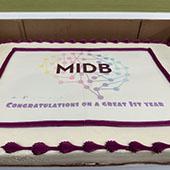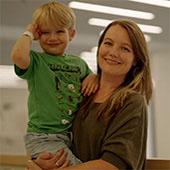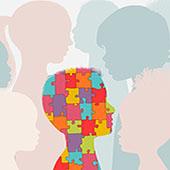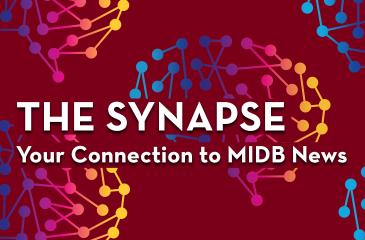The Synapse: November 2022
Creating Culturally Responsive Resources for MIDB Families

A part of our Community Engagement & Education (CEEd) Hub mission is to include our local communities in every aspect of MIDB services, research, and policy. But how can we do that when certain neurodevelopmental words like “autism spectrum disorder” don't exist in other languages and other cultures?
This is one of the issues I have come across again and again during my global health work in Africa, especially in rural remote villages where families often thought conditions like autism, cerebral palsy, and epilepsy were caused by bad spirits and couldn't be cured. So how do we care for children and connect with families who aren’t able to understand their condition?
One way we’re tackling this issue is by creating materials that connect culturally with children and their families. We recently completed Mindfulness, Anxiety, and You: A Culturally Responsive Anxiety Workbook for Teens & Tweens.
We collaborated with colleagues from the U of M Duluth who have experience in creative writing for children’s stories and community outreach and partnerships with area tribal communities, as well as an Afro-Indigenous Lakota illustrator and community based organizations and care providers to develop this comic book-style workbook that is culturally-specific and catered to underrepresented adolescents.
This is the first of a planned series of culturally-specific resources. Our goal is to not only make these storytelling resources educational for children and families, but to also help providers educate ourselves so we’re more aware of cultural contexts in describing mental health.
Thank you,
Anita Randolph, PhD
Community Engagement & Education (CEEd) Hub Director

MIDB One-Year Celebration Event
Thank you to everyone who attended our One-Year Celebration Event on Oct. 13. Attendees enjoyed a lunch of barbecue, egg rolls and more from food trucks, and celebration cake. The afternoon of activities ended with a MIDB Colloquium presentation by Jeff Wozniak, PhD.

MIDB Welcomes New Certified Child Life Specialist
Cala Hefferan, MA, recently joined MIDB as a certified child life specialist. In this role, Hefferan will assess pediatric patients (or participants) and families' potential stress factors, including past experiences, developmental and psychosocial needs, and contributing family dynamics, to design and facilitate interventions to reduce stress and promote coping. "I have been interested in pursuing the child life specialist position at MIDB since I first heard about MIDB," said Hefferan. "My passion for evidence-based best practices and supporting research were leading contributors. In addition, as a nature enthusiast, the therapeutic value of the indoor and outdoor qualities of MIDB is intriguing and inspiring, especially when I consider therapeutic interventions available with our future facility dog. As I learn more about the patient populations and research conducted at MIDB, my excitement grows! Everyone at MIDB is very welcoming, and I look forward to continuing to collaborate with the clinic and research staff." Read more about Hefferan and this new role at MIDB.

Using Telehealth to Help Families When They Need it Most
Jessica and her husband Andrew wondered if their son Elias might be autistic. They also knew that early intervention, while his brain was still developing, was critical to providing him with the support he needed. Trouble is, the wait list to see a specialist for the neurological disorder can be months and even a year or more long. Fortunately, the Mendota Heights couple was referred to Bridging Barriers, a telehealth study from the Institute on Community Integration and the U of M Medical School's Department of Pediatrics—both part of MIDB. In just four weeks, they had that critical diagnosis. Even better, they’re getting coaching on how to help their four-year-old son while they climb the wait list. “Time is neurons,” says Jessica with an ever-watchful eye on her playful boy. “We can’t put our son’s developing brain on pause.” Agrees Amy Esler, PhD, the study’s lead psychologist: “The brain, at this stage, is so malleable. Making sure kids learn to talk, for example, is much easier when they’re two or three than when they’re ten or 11.” Learn more how telehealth is helping this family.

Researchers to Develop A Genomic Data Commons, A Central Hub for Sharing and Harmonizing Genomic Data
Researchers from the School of Public Health and MIDB are developing a new tool that will significantly enhance genomic research at the University. Named the UMN Genomic Data Commons (GDC), the project’s developers envision it as a centralized hub for data sharing and for harmonizing genomic datasets. The UMN GDC will focus on developing three specific areas:
- A centralized place to store local and publicly available genomic data, pre-processed, harmonized, and integrated according to principles developed by the National Institutes of Health (NIH) data commons initiative.
- A web interface for end users to access basic summary information about these datasets and submit requests for data analysis.
- Analytic pipelines to perform different genomic analysis utilizing the GDC’s integrated datasets.

Where Clinical Care and Research Collide: Autism & Neurodevelopment Clinic
Led by Rebekah L. Hudock, PhD, LP, NCSP, and Chimei Lee, PhD, LP, our Autism & Neurodevelopment Clinic treatment programming provides group therapeutic services to children, adolescents, and young adults with autism and related neurodevelopmental conditions—such as anxiety, ADHD, and genetic conditions—and their families. Participants generally range between 8 and 30 years of age. Our core programs include evidence-based programs such as PEERS (Program for the Education and Enrichment of Relational Skills), Facing Your Fears, and Transitioning Together. These programs focus on social relationships, anxiety management, and preparing for the transition to adulthood. Learn more about our work in the Autism & Neurodevelopment Clinic.

MIDB Makes an Impact at U.S. Developmental Origins of Health and Disease Society Conference
The U.S. Developmental Origins of Health and Disease (DOHaD) Society 6th Annual Meeting was held last month at the U of M. An affiliate of the International DOHaD Society, the U.S. DOHaD focuses on all facets of the study of the fetal origins and early life programming of health and disease. Phu Tran, PhD, leader of MIDB’s Translational Hub and president of the U.S. DOHaD Society, served on the planning committee and provided welcoming and introductory remarks. MIDB Co-Director Michael Georgieff, MD, provided the opening keynote presentation, "What's on Baby's Mind: The Developmental Origins of Adult Mental Health and Disease." Read more about MIDB’s presence at the conference.

MIDB Artwork Spotlight: "Bonding"
Created by David M. Brown, MD, emeritus professor and former dean of the Medical School, the bronze statue "Bonding" is now installed at MIDB as part of our permanent art collection. Brown describes "Bonding" as a tribute to the unique and invaluable relationships of children and their mothers. After a prolific career in academic medicine, Brown said as he neared retirement he realized that he had a passion for art. He said, "As time went on, the passion for art began to grow and it gave me a great deal of satisfaction." After leaving the U in 2004, Brown says he "embarked upon a very wonderfully rewarding, pleasureful career in art ... medicine and art are actually good partners ... sculpting has been wonderfully challenging with all kinds of new possibilities for creativity." Read more about Brown.

Boosting Brain Power
The ability to see inside the human brain has improved diagnostics and revealed how brain regions communicate, among other things. Yet questions remain about the replicability of neuroimaging studies that aim to connect structural or functional differences to complex traits or conditions, such as autism. Spectrum recently talked to MIDB Co-Director Damien Fair about solutions to the problem and reproducibility issues in neuroimaging studies in general. Read the interview.
- International Institute for Biosensing: LOI due by 5 p.m. CST Nov. 18
- Early Innovation Fund: Submissions due Nov. 21
- Translational Neuroscience Core: Call for Seed Grant Applications: Applications due Dec. 30
- Child Health Collaborative Grant: Applications due Jan. 27, 2023
- NSF Integrative Strategies for Understanding Neural and Cognitive Systems - LOI due Dec. 15, full proposals Feb. 15, 2023
- Simons Foundation Autism Research Initiative Pilot Award - Application deadline Jan. 12, 2023
- NSF Cognitive Neuroscience: Proposals due Feb. 11, 2023
- HRSA Using Innovative Digital Healthcare Solutions to Improve Quality at the Point of Care (R21/R33): Due Feb. 16, 2023
- NIH Research on Autism Spectrum Disorder (R03) - Due Feb. 16, 2023



